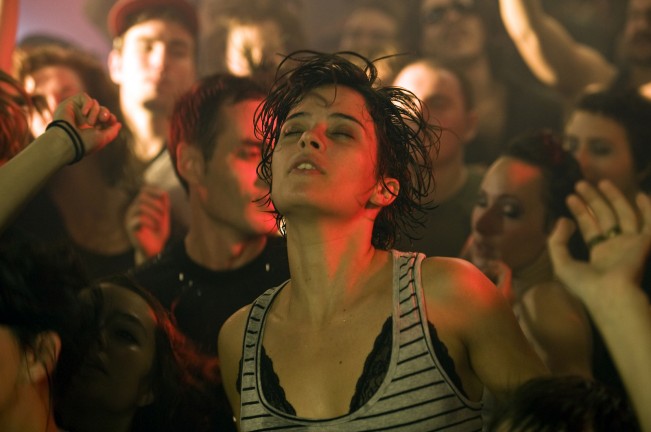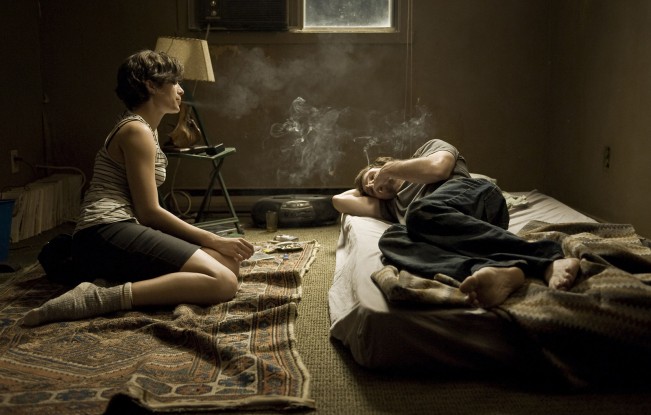

By Gary Dretzka Dretzka@moviecitynews.com
‘Nuit #1’ explores love, sex and despair in Montreal’s lost generation
 Montreal may seem a million miles from Nashville, but you don’t have to speak French to see how Anne Emond’s psychosexual drama “Nuit #1” resembles any number of country songs about temporary lovers and one-night stands. Take the Amazing Rhythm Ace’s “Third Rate Romance,” for example.
Montreal may seem a million miles from Nashville, but you don’t have to speak French to see how Anne Emond’s psychosexual drama “Nuit #1” resembles any number of country songs about temporary lovers and one-night stands. Take the Amazing Rhythm Ace’s “Third Rate Romance,” for example.
Instead of meeting over drinks “at a tiny table in a ritzy restaurant,” the lovers in “Nuit #1” find each other at an Ecstasy-fueled rave, while pogoing to electro-trance music. The effect is the same:
“Talk was small when they talked at all/They both knew what they wanted/There was no need to talk about it/They were old enough to scope it out/And keep it loose …
“She said, ‘You don’t look like my type, but I guess you’ll do’/And he said, ‘I’ll even tell you that I love you if you want me to’/Third rate romance/Low rent rendezvous.”
It all happens in a flash. No sooner do Emond’s lovers kick the door of his apartment shut than they’re groping each other and striping off their clothes. The cherry is added to the sundae when Nikolai apologizes for having to ask Clara what her name is. The same thing happened in Rod Steward’s “Stay With Me,” another song about sex without love, intimacy without passion.
“There’s a lot of me in ‘Nuit #1,’ of course,” the first-time writer/director allows. “I know how it feels to be 30 and lost.”
Mostly, Emond adds, it’s a composite portrait of people she knows in Montreal.
“The people dancing alongside Clara in the opening sequence aren’t actors … they’re friends,” she says. “They’re the people whose lives shaped the characters. Here we are, nearly 30 years old now, and we we’re still doing this stuff.”
 If artfully rendered sex and pretty faces were the only thing “Nuit #1” had going for it, the movie probably wouldn’t have found traction off the festival circuit. Even with all the pre-release notoriety it garnered, Michael Winterbottom’s similarly plotted and far more explicitly sexual “9 Songs” didn’t set turnstiles twirling here. Neither do the erotically charged movies of Patrice Chereau and Catherine Breillat.
If artfully rendered sex and pretty faces were the only thing “Nuit #1” had going for it, the movie probably wouldn’t have found traction off the festival circuit. Even with all the pre-release notoriety it garnered, Michael Winterbottom’s similarly plotted and far more explicitly sexual “9 Songs” didn’t set turnstiles twirling here. Neither do the erotically charged movies of Patrice Chereau and Catherine Breillat.
“I knew about those movies when I was writing ‘Nuit,’ but they weren’t an inspiration,” Emond insists. “To me, ‘9 Songs’ seemed more like hard-core porn. I wasn’t shocked by it, but I wanted something more natural and less explicit.
“I was more inspired by Jean Eustache’s ‘The Mother and the Whore,’ with Jean-Pierre Leaud.”
That 215-minute relationship epic, from 1973, involves a trio of bored young people – not unlike Clara and Nikolai – who share an open marriage and whose concept of the future is tomorrow. When they’re not in the sack, Leaud spends a lot of time sitting in cafes, sleeping around, getting high or drunk and talking endlessly about himself. The women are a bit more grounded.
In “Nuit #1,” the characters played by Catherine De Léan and Dimitri Storoge do a lot of talking about themselves, as well. To get to that point, however, Clara is required to alter her usual pattern of coming and, immediately thereafter, going away from her latest empty liaison. For his part, Nikolai is harboring rage over being an artist without much discernible talent and an intellectual who can’t seem to finish anything he starts, especially books.
When Nikolai wakes up from a light sleep and notices Clara leaving, he tears into her with the kind of insights and insults generally reserved for unhappily married couples. It’s an ugly, if necessary chapter in the narrative. After one false start and more abuse from Nikolai, she finally does leave the dumpy apartment building. Uncharacteristically, he chases after her to say he’s sorry.
At first, we feel sorry for the waif-like Clara, who, when she’s not out cavorting, teaches third-graders. We also wonder how, out of all the men she could have chosen, she made the mistake of going home with this dickhead? OK, he’s handsome in an exotic sort of way, but how could Clara have allowed herself to sleep on sheets that probably have never been washed and bathe in a tub that isn’t much cleaner?
The answer, we learn in the long, deeply felt confessions that replace the sex in the 91-minute film, is that she isn’t particularly choosy when it comes to the men with whom she sleeps. If they have one redeeming quality, at least, they’re in. By contrast, Nikolai hasn’t had sex in six months and he had to be dragged to the club by friends. He was attracted to Clara for the same reasons we are: she struck him as being “free” and “pure,” if not much of a dancer.
In a pair of soliloquies that follow, Clara admits to even more unpleasant habits than being an indiscriminate lover. Indeed, there’s very little that’s free and pure about her. Referring to herself as an “empty shell,” living in a fog, Clara says she can’t remember the number of men with whom she’s slept, enjoys that they assume she’s a “slut” when she walks into a room and gets her nourishment from pills, pot and booze.
 In his confessional, Nikolai lets down his guard long enough for us to think he may be worthy of our sympathy, after all. The ex-pat Ukrainian may be a prick, but, at least, he doesn’t have to hide his “secret life” from school administrators and the PTA. Somewhere, deep down, he might even harbor a soft spot.
In his confessional, Nikolai lets down his guard long enough for us to think he may be worthy of our sympathy, after all. The ex-pat Ukrainian may be a prick, but, at least, he doesn’t have to hide his “secret life” from school administrators and the PTA. Somewhere, deep down, he might even harbor a soft spot.
Sad, honest and desperately revealing, the rambling monologues may remind older viewers of Marlon Brando’s speeches in “Last Tango in Paris.” All that’s missing is the butter.
The fact is, Clara tells Nikolai, “When the sun comes up, I begin to panic. I can’t let the euphoria end.”
“Sex is the only thing Clara knows how to do well,” Emond says. “She’s only been able to keep her job because the union has made it too difficult to fire teachers, and she keeps coming back to Nikolai’s apartment because she can’t bear to be alone. Neither can he.”
The emptiness both of them feels translates well off screen. Apart from the opening dance sequence and a couple of minutes spent in the rain-soaked street outside Nikolai’s apartment, “Nuit #1” unfolds in his cluttered living room and cramped bathroom.
“There are essentially five big scenes … the sex, he said, she said, he said, she said,” Emond explains. “There was no improvisation and we limited ourselves to three shots for every long sequence. It was easy to fail, because any mistakes couldn’t be saved in the editing room.
“There were times when I wondered what we were doing. The only choice we had was to trust the words and the actors.”
Apparently, she didn’t allot any time to worry how the sex scenes would play off the festival circuit. “Nuit #1,” which practically plays out in real time, is going out unrated and absent the kind of marketing effort that accompanies most mainstream titles.
“I never thought about how shocking the sensuality might be to audiences,” Emond says. “Quebec is not Canada … I’ve paid a lot more attention to films from France and other European countries, than Canada and Hollywood. I wasn’t concerned about it until I began to wonder how my mother might react.
“Besides being an exploration of sex, intimacy and love, ‘Nuit #1’ is a film about despair, individualism and the anxieties of belonging. It does, however, expose the potential in even the most fleeting encounters.”
Viewers will have to decide for themselves if Emond’s ending qualifies as happy, enigmatic or raw material for another sad country song.














Me parece una película extraordinaria… Con dos muy buenos actores, buena dirección y un mensaje esperanzador y reflexivo… Felicidades…